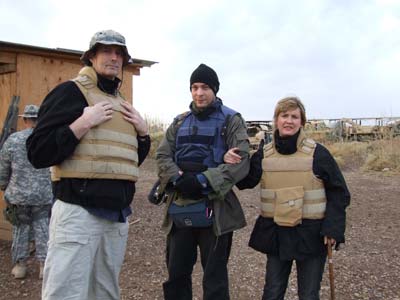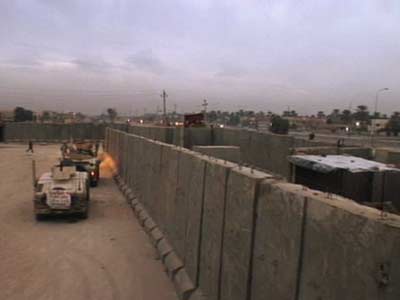Baghdad, November 2006

Martin Smith (l), Tim Grucza (c) and Marcela Gaviria (r)
In a low-lying set of buildings crowded round a small, shabby courtyard is the Baghdad HQ for the 4th brigade of the US Army's 10th Mountain Division. There's a few broken slabs of concrete, a small tree, a couple of picnic tables and a thousand cigarette butts. Soldiers mill about. Today is Thanksgiving and there is talk of food and family and going home. I am there with producer Marcela Gaviria and cameraman Tim Grucza waiting for our "embed," the patrol that will take us out to visit some Iraqi police.
After about 20 minutes, we move into one of the small, trailer-shaped buildings facing the courtyard, down a narrow, fluorescent-lit hallway, to a small room where a police advisory team has gathered for a pre-op briefing. The walls are covered with large, four-foot square, black and white Google road maps of the surrounding neighborhoods. Major streets and boulevards have been renamed after popular brands of hard liquor: Route Dewars, Route Bacardi, Route Stoli, etc.
Sgt. David Faircloth, the unit commander, arrives and immediately instills a certain confidence. He's got a solid, square build with a round, open face and, most important to me, he looks like he knows what he's doing. He tells us we're going into the Sunni enclave of Adhamiyah. Residents there face an uncertain fate, as Shi'ite militiamen and government-run death squads have slowly been forcing all of Baghdad's Sunnis farther westward. Adhamiyah stands as one of the last remaining Sunni neighborhoods east of the Tigris River, now hemmed in on three sides by Shi'ite districts.
"Right now Adhamiyah is pretty hot," Faircloth instructs. "We got sniper threats. We got IED threats. EFP threats…. And they all know it's Thanksgiving. … and they are going to hit us. All right? Let's just hope it's grenade, small arms fire, stuff we can handle. All right?"
The team consists of 11 soldiers, a terp (an Iraqi translator) and an IPLO, an Iraqi Police Liason Officer. IPLO's are private contractors under U.S. State Department hire, there to monitor how the training of Iraqi police is going. The teams run missions which include mounting joint patrols, setting up checkpoints, searching suspicious houses or responding to trouble.
Of course, it can be extremely dangerous. The Iraqi police are run by the Shi'ite-controlled Ministry of Interior. Police units are generally sympathetic to, if not heavily infiltrated by, Shi'ite militia groups such as Moqtada al-Sadr's Mahdi Army. Sunni insurgent groups, including Al Qaeda in Iraq, frequently target the police with bombs of one sort or another.
After about ten minutes of orientation, we drag our flak jackets and helmets out beyond the courtyard to a "staging area" where a half dozen humvees are parked and waiting. Marcela has decided to stay at the base. Tim and I are assigned seats in different vehicles and after about an hour of prep and checking of radios, guns and ammo, we set out. It's a given that every day is a crap shoot. I'm hoping our luck will hold. It's a short drive from Camp Shield to the station.
On the way Sgt. Faircloth gets a radio call from the brigade HQ. He's told some kind of car bomb has gone off in nearby Shi'ite Sadr City. He then radios out to the other soldiers in our convoy. "We got a VBIED detonation. We are going to go to it. What I want you to do is take a right to the station… We are going to go inside and grab some IP's (Iraqi police) and we are going to that VBIED detonation and see what the injuries and damages are."
We pull off the highway and enter the police station through a baffle of 20-foot-high cement sectional barriers - they surround the entire station. There is no visibility of the adjacent neighborhood unless you climb into one of the guard towers sitting atop the station's corners. It reminds me of a prison, not a precinct house. At the center of the yard sits a one-story building with offices and a small jail. What is most striking today is that nobody's home. Two or three policemen step outside. They look like they've just been roused from mid-afternoon naps.
Faircloth asks to see the police chief. No answer. The IPLO gets a smirk and a shrug. Beyond that the officers say nothing. Faircloth walks about talking to himself. "Why is the place so empty? How come nobody can f---ing tell me if anybody is here? What the hell is going on?"
It's not altogether surprising. Delinquency has plagued U.S. efforts to "stand up" the Iraqi police since late 2003, when the training program got started. Often policemen just don't show up to work. The advisory team visits are designed like spot inspections. During our two months making this film, we visited a handful of stations. We found them more or less occupied. Today was different. With no Iraqi police on hand, Faircloth changes plans. He tells another soldier… "I'm not going into Sadr City with no IP's." While we're talking about what to do next, the police chief, Captain Fouad, drives into the station.

A view of the cement barrier walls surrounding the police station.
He's dressed in civilian clothes and doesn't offer to explain his absence. Instead, he quickly invites Faircloth, the State Department IPLO, the terp and a few other soldiers into his office. The electricity is out. He sits behind his desk and the rest of us sit on big upholstered chairs backed up against the walls. With so much furniture, the office is cramped. Fouad takes a golden revolver out of a drawer and lays it on the desk in front of him. The conversation is peppered with teasing and laughter. Faircloth and Fouad act like men who know each other well. There have obviously been many such visits.
After a few minutes of small talk, Fouad turns to me and asks why Tim and I are filming. When I tell him our documentaries are available to watch on the Internet, it makes him nervous. I assure him his face will be obscured.
Conversation resumes, but I can see that Fouad is uneasy. Faircloth gets down to business. "How's Adhamiyah? Any issues today?" he asks.
Stitting next to Fouad is another Iraqi in civilian clothes with a handheld walkie-talkie type radio. Suddenly it crackles on and we hear a man speaking with some urgency... The terp leans toward Faircloth. "He is saying, `Sir, we found a car bomb and we arrested its driver. Two patrols and an officer captured him, sir.'"
The man puts down the radio and he adds, "The driver was a woman and she detonated a bomb under her clothing while in police custody.There are 28 dead and 48 injured."
For Baghdad, this was not out of the ordinary. Since Sunni militants bombed the sacred Shi'a Golden Dome mosque in Samarra, in February 2006, sectarian killing has run rampant. In November, I routinely would awake in the morning to the sound of the latest Sunni suicide attack. In retaliation, Shi'a death squads dumped an average of 50 Sunni men onto the streets of Baghdad - many tortured beyond recognition - each and every day.
Faircloth asks Fouad for a second time. "Where were you when we came in?"
The radio interrupts again.
The man with the radio: "Some Sunni militants dressed as IP's have set up a phony checkpoint, stopping cars and asking people for their ID's. They are executing some of those with Shi'ite names."
Faircloth looks at some of us sitting around and adds dryly, "Okay, so it's just another typical day in Baghdad."
The man with the radio again: "Sir, someone just found a sixth car bomb in Sadr City. The wires were all rigged inside and led from the steering wheel to the driver's seat where the explosives were stuffed. The police are going to detonate it now, sir."
I look over at Foaud who is quietly fondling the golden gun. I'm still waiting for him to tell Faircloth why the station is so empty and where he was, when we hear a mortar explode somewhere nearby. Three soldiers run outside. The rest of us follow. Another mortar and then another explode.
"What was that?" says a soldier. A minute later. A louder explosion. With a camera I walk over to the nearest guard tower where I hope to get a view of the neighborhood to see what's happening outside the walls. The guard, who is protected by sandbags up to his neck, points in the direction of a mosque down the street. "Boom. Boom," he says, but I can't see anything. I take a few shots of the streets. I wonder if I'm looking at route Johnny Walker Red or Johnny Walker Black and climb back down.
The next thing I know is that Captain Fouad has jumped back in his squad car and is leaving the base. He didn't say goodbye.
"Something bad is going to happen," says the terp, trying to convince Faircloth it's time to abandon this mission and go back to base.
Faircloth radios back to HQ recommending they bail out and get back to Camp Shield. We had come along to see the Iraqi police in action. President Bush insists, as "they stand up, we will stand down." On this day, the police were on the run, doing who knows what.
We get back to the base just after dark. We learn that five large car bombs have exploded in rapid succession in Sadr City. Apparently other bombs were discovered by police before they could do any harm. In retaliation, a dozen or more mortars were fired from Sadr City towards Adhamiyah. (See Map.)That Thanksgiving Day still stands as the deadliest day of Iraq's sectarian war.
We had been scheduled to leave Baghdad on a flight to Jordan and then home. With violence spiraling out of control, we learn the city has been put under a 24-hour curfew and the airport closed. We don't get out of Baghdad for another five days.
home + introduction + watch online + interviews + join the discussion + reporters' notebooks + baghdad video diaries
site map + readings & links + dvd/vhs & transcript + press reaction + credits + privacy policy + journalistic guidelines
FRONTLINE series home + wgbh + pbs
posted april 17, 2007
FRONTLINE is a registered trademark of wgbh educational foundation.
photo copyright © corbis
web site copyright WGBH educational foundation
![gangs of iraq [home page]](../art/p_title.gif)
